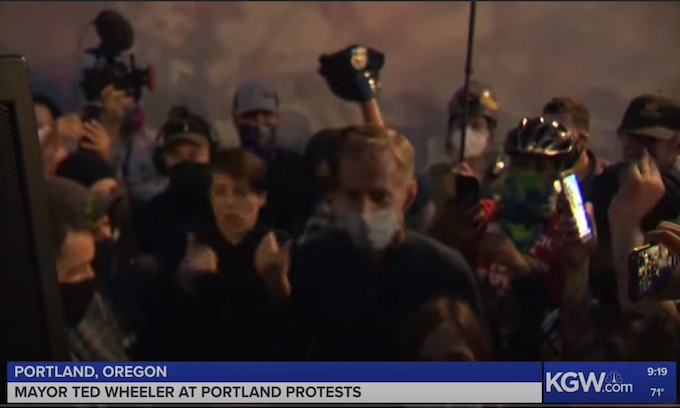A federal judge Friday denied a restraining order that Oregon’s attorney general sought to restrict federal officers’ tactics in Portland, finding the state lacked legal standing.
U.S. District Judge Michael W. Mosman issued his ruling after hearing about 90 minutes of argument on Wednesday.
“Because it has not shown it is vindicating an interest that is specific to the state itself–I find the State of Oregon lacks standing here and therefore deny its request for a temporary restraining order,‘’ Mosman ruled in the 14-page decision.
Oregon Attorney General Ellen Rosenblum had urged the judge to bar federal officers from engaging in “unconstitutional police state-type tactics,‘’ alleging the federal officers have violated the protesters’ rights to free expression and assembly, unreasonable search and seizure and due process.
The attorney general and her lawyers referenced two incidents last week by men in camouflage fatigues who took 29-year-old Michael Pettibone off a downtown street about 2 a.m. on July 15, placed him in an unmarked van and took him to the federal courthouse for questioning. Another person, the next day, was caught on a widely circulated video on social media being led away to an unmarked dark van by men in camouflage, later identified as Customs and Border Patrol officers.
The suit was filed against the U.S. Marshals Service and the Federal Protective Service, seeking to bar federal officers from illegally detaining anyone without probable cause on city streets and whisking them off in unmarked rental vans.
“The State has presented just one example of an arrest without probable cause and one example of an unreasonable seizure. That is the sum total of the evidence before me that underpins the legal injuries the State asserts in its brief,” the judge wrote. “In both instances of a federal seizure it is either admitted or clearly visible that the agents’ uniforms say ‘Police.’ ”
Mosman explained further why the state failed to prove it had standing to bring the case.
“The injury the state asserts is entirely conjectural. First, the state candidly admits that it does not have a shred of evidence that counter-protesters have ever, anywhere, kidnapped a protester or anyone associated with protests,” he wrote. “Second, the asserted interest rests on an utterly implausible inference. The State’s reasoning is that counter-protesters, once they learn of seizures of protesters by federal agents, will dress up like police and go out on private missions to kidnap protesters. This despite the fact that such kidnappings are Measure 11 felonies in Oregon, punishable by mandatory minimum sentences of up to 70-90 years in prison.”
The judge added, the state’s idea that seizures by law enforcement will lead to kidnappings by private parties is “a bridge too far.”
David M. Morrell, a U.S. Department of Justice attorney, had argued that the state did not have standing to sue the federal government and failed to prove that the detention of Pettibone or the other person captured on video was unlawful.
The Justice Department attorney had urged the judge to use caution and not direct how police should do their jobs. What the state was seeking could curtail investigatory stops by officers, known as Terry stops, which are based on a different legal standard of “reasonable suspicion” rather than probable cause and are a lawful investigatory tool, Morrell argued.
Officers must make “split-second judgments” in “tense, uncertain, rapidly-evolving” circumstances, Morrell said, and he asked the judge to use caution and not allow the courts to direct how police do their jobs.
Mosman’s ruling comes on the 58th consecutive days of protests in the city following the May 25th death of George Floyd, a man killed by a Minneapolis police officer who knelt on his neck for more than eight minutes.
Mosman further addressed the state’s argument that the actions by federal officers in camouflage uniforms, plucking at least two people off the street without being told why, would have a chilling effect on others’ free speech.
Attorneys for the attorney general asked for a court order partly to require federal officers to verbally identify themselves and explain to those they stop who they are and why they’re being stopped.
“The injury the state asserts–a chilling of its citizens’ speech–is not actually redressable by the requested remedy, given that citizens could still believe they might be kidnapped even if police are required to verbally identify themselves,‘’ Mosman wrote. “Apparently, the word ‘police’ and other official insignia on uniforms has not quelled this fear among the public, and it is highly questionable whether the requested relief would do so either.”
— Maxine Bernstein
___
(c)2020 The Oregonian (Portland, Ore.)
Visit The Oregonian (Portland, Ore.) at www.oregonian.com
Distributed by Tribune Content Agency, LLC.
—-
This content is published through a licensing agreement with Acquire Media using its NewsEdge technology.



















Recent Comments